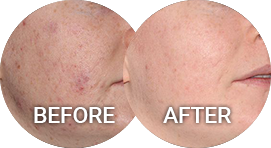Allergies and Brain Health
Conveniently located to serve the areas of Phoenix, AZ

The connection between allergies and brain health is important for preventing conditions that can affect your mental clarity. Underlying inflammation from allergies can increase your risk of developing conditions such as Alzheimer’s disease (1) that affect your cognitive function, personal relationships, and ability to perform daily tasks. At Pineapple Health, we specialize in comprehensive allergy testing that has helped thousands of patients improve their quality of life. We offer targeted minimally invasive treatments for allergies that can fortify your body to reduce your symptoms safely and effectively.
Dr. Kevin Chan, a board-certified lipidologist has been helping patients for decades and is well-known for his innovative allergy tests that can help patients achieve effective results. Living with symptoms of seasonal allergies is not just an inconvenience, it can put you at risk for developing chronic illnesses.
Do not wait to prioritize your well-being. Contact our office or call (480) 961-2366 to learn more about how we can help your body recover from allergies. Take our Allergy Assessment Questionnaire to get started and learn more about the types of allergy testing available for improving your health.
Contents
- 1 About Allergies and Brain Health
- 2 Types of Allergy Testing
- 3 Benefits of Allergy Testing for Brain Health
- 4 Candidates
- 5 Consultation
- 6 Allergy Therapy
- 7 Recovery & Results
- 8 Cost of Allergy Testing in Phoenix
- 9 FAQ
- 9.1 Can allergies affect brain health?
- 9.2 Can allergy treatments help with brain fog?
- 9.3 How do I know which type of allergy test is right for me?
- 9.4 Are allergies linked to long-term mental conditions?
- 9.5 Will I need more than one type of allergy treatment?
- 9.6 What should I do if my allergies are affecting my work?
- 9.7 Do allergy and brain health treatments include lifestyle changes?
- 10 References
About Allergies and Brain Health
Allergies can impact brain health because the inflammation they cause wears on your immune system. Your body’s constant response to inflammation can exhaust you, leaving you susceptible to developing chronic illnesses. With allergy testing, we can reduce your body’s reaction to improve your sleep quality and mental clarity. When your organs become inflamed, they can cause your brain to become inflamed as well (neuroinflammation). (1) Mental stress can also lead to brain inflammation, (2) and allergies can significantly raise the stress levels of patients who suffer from them. (3) They can even affect your working memory and ability to perform daily tasks accurately. (4) With allergy testing and therapies, we can reduce your symptoms, helping you build a tolerance to different allergens.
Types of Allergy Testing
An allergy test takes approximately 15 minutes, and we can perform different types of testing to identify the allergens that are causing your symptoms:
- Blood Testing: During a blood test, also known as a “finger poke” test, we will use a thin needle to prick your finger and draw a small amount of blood. We can also draw several vials of blood if you need additional testing to identify allergens.
- Scratch Testing: During a scratch test, we will lightly score the surface of your skin with common allergens and examine your skin’s reaction. If you have redness, swelling, or itching, this test can help us identify allergens immediately. It is especially helpful for airborne and food-related allergies.
Benefits of Allergy Testing for Brain Health
Identifying and managing allergies offers numerous benefits that can lead to improved brain health and overall well-being:
- Improved cognitive function: Addressing allergies may reduce brain fog and enhance focus and concentration.
- Enhanced sleep quality: Proper allergy management can lead to better sleep cycles, directly impacting mental clarity.
- Reduced depression and anxiety: Managing allergies can improve mental stress levels and psychological well-being.
- Decreased inflammation: Effective treatments can minimize inflammation linked to allergic responses, mitigating long-term brain health risks.
- Strengthened immune system: Managing allergies can improve the body’s overall immune response, decreasing susceptibility to infections that could affect the brain.
- Better quality of life: Alleviating allergy symptoms can lead to increased productivity and improved interpersonal relationships.
- Reduced risk of chronic conditions: Proactive management of chronic allergies can reduce your risk of developing chronic conditions that disrupt your life.
Candidates
Suitable candidates for allergy testing would like to improve their symptoms and often struggle with:
- Chronic headaches
- Fatigue due to allergic reactions
- Sleep disturbances linked to nasal congestion or respiratory issues
- Difficulty concentrating or experiencing memory issues
- Symptoms of anxiety or depression correlated with allergy seasons
Screening is also a form of preventative care even if you are not experiencing symptoms. Some Americans have become so accustomed to the symptoms of allergies and underlying inflammation that they are unaware they have them. Diagnostic testing can help you identify foods and environmental factors that are putting stress on your body to prevent long-term inflammation that can lead to chronic illness.
Consultation

During your consultation, we can discuss your symptoms and lifestyle to determine the best type of allergy test to perform. We may ask you to keep a detailed record of your symptoms in the weeks leading up to your appointment and bring it with you to your consultation. If you are taking any medications, you must let us know before your allergy test. Steroids, antihistamines, and heartburn medication can affect the accuracy of your allergy test results.
Allergy Therapy
After we identify your allergens, we can recommend several different types of treatments to help you reduce your symptoms:
- Allergy Shots: Injections can help your body develop a tolerance to the allergens that are causing your symptoms. With a simple injection, we can help your body develop a long-term tolerance. During the treatment, we will cleanse your skin and administer the injection into your arm. Although allergy shots are not vaccines, they can effectively treat your symptoms and help you develop a lasting tolerance.
- Sublingual Immunotherapy (SLIT): SLIT is an effective therapy that involves spraying an extract that contains different allergens beneath your tongue to help your body develop tolerance and reduce your symptoms. Over the next few days or weeks, we can increase the dose slowly until your body is desensitized and prepared for a maintenance dose. You can continue taking the maintenance dose over the next several months or long-term, depending on your treatment plan and symptoms.
We may also prescribe antihistamines and corticosteroids to help you manage your symptoms. If your allergens are present in your diet, we may recommend avoiding certain foods to improve your energy and mental clarity.
Recovery & Results
After allergy treatment, there is no downtime and you can immediately return to your daily routine. You can begin to enjoy an improvement in the way you feel over the next few weeks, depending on the type of treatment you receive. It is important that you make time to avoid triggers, consistently make lifestyle changes, and take your medication as prescribed for the best results. Both treatments are long-lasting and can help desensitize your body for several years to prevent inflammation when exposed to allergies.
Cost of Allergy Testing in Phoenix
The cost of your allergy treatment will depend on your symptoms and specific treatment plan. We can discuss the best type of testing and treatment for your needs. We take a holistic approach and will personalize your allergy treatment based on your medical history and lifestyle. With a simple allergy test, you can improve your quality of life and long-term health.
Contact our office or call (480) 961-2366 to learn more about how we can help you find relief from allergies with holistic treatments.
FAQ
Can allergies affect brain health?
Yes! There is growing evidence that severe allergic reactions can contribute to neuroinflammation, a condition that affects the brain and can disrupt neurotransmitter balance. In turn, this can lead to symptoms like brain fog, decreased mental clarity, and overall impaired cognitive function. Chronic exposure to environmental allergens may also elevate the risk of developing allergies to foods and contribute to respiratory problems, making management crucial for maintaining brain health.
Can allergy treatments help with brain fog?
Yes, managing your allergies can help you reduce symptoms such as brain fog and enhance your cognitive function.
How do I know which type of allergy test is right for me?
During your consultation, we can discuss your symptoms and the best type of testing for your needs.
Are allergies linked to long-term mental conditions?
Yes, untreated allergies can contribute to feelings of anxiety and depression over time as they negatively impact sleep and quality of life.
Will I need more than one type of allergy treatment?
Depending on the type of allergies you have, you may need a combination of therapies. We can discuss the best treatment plan during your consultation to help you find relief.
What should I do if my allergies are affecting my work?
If your allergies are affecting your work, we can perform diagnostic testing to help you identify the cause of your symptoms to improve your work performance and mental health.
Do allergy and brain health treatments include lifestyle changes?
Yes, if you have an allergy to certain foods, we recommend that you change your diet and habits to avoid the allergen.
References
- Sarlus H, Höglund CO, Karshikoff B, et al. Allergy influences the inflammatory status of the brain and enhances tau-phosphorylation. Journal of Cellular and Molecular Medicine. 2012;16(10):2401-2412. doi:https://doi.org/10.1111/j.1582-4934.2012.01556.x
- Sun Y, Koyama Y, Shimada S. Inflammation From Peripheral Organs to the Brain: How Does Systemic Inflammation Cause Neuroinflammation? Frontiers in Aging Neuroscience. 2022;14. doi:https://doi.org/10.3389/fnagi.2022.903455
- Oh H, Koyanagi A, DeVylder J, Stickley A. Seasonal Allergies and Psychiatric Disorders in the United States. International Journal of Environmental Research and Public Health. 2018;15(9):1965. doi:https://doi.org/10.3390/ijerph15091965
- Papapostolou G, Kiotseridis H, Romberg K, et al. Cognitive dysfunction and quality of life during pollen season in children with seasonal allergic rhinitis. Genuneit J, ed. Pediatric Allergy and Immunology. 2020;32(1):67-76. doi:https://doi.org/10.1111/pai.13328



